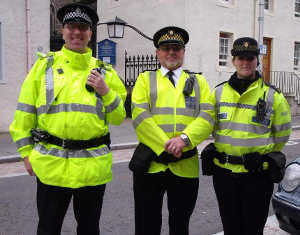Traffic Wardens – What You Need to Know

With soaring fuel costs, road tax, and increasing insurance policy premiums for private and motor trader drivers, it’s hardly surprising many motorists of new and used cars show little patience when it comes to parking fines, even less so when actually cornered by a traffic warden issuing a PCN (penalty charge notice).
However, traffic wardens do play an important part in keeping traffic flowing in our towns and cities, maybe it’s just an illusion that there seem to be so many around.
It’s generally best to try to remain as calm as possible if a PCN is coming your way, but here’s some motor trade industry inspired information about traffic wardens and parking which may help to prevent any future encounters.
Can I drive off before a ticket is fixed to my windscreen?
If a warden has issued a PCN but not yet placed it on your car, your vehicle registration number will still have been logged. Therefore, the council can request vehicle registration data from the DVLA – which means you may well risk getting a PCN through the post.
Is there really a 10-minute ‘period of grace’ before a ticket is issued?
The RAC have stated: ‘Traffic wardens must give motorists a grace period of up to 10 minutes after their parking ticket expires,’ adding that this applies in both private and council car parks.
However, the AA comment that ‘privately owned car parks can set their own rules.’ In addition, some local authorities have even been known to issue parking tickets within two minutes of the expiry of a valid ticket.
So be cautious is the best advice – otherwise you may soon have to tell your insurance broker about all those parking fines adding up!
What are a traffic warden’s powers?
Traffic wardens or CEOs (civil enforcement officers) are council employees tasked with ensuring drivers comply with parking regulations and issuing PCNs or fines for non-compliance. Even though that’s the limit of their authority, CEOs often report to the police on matters such as any suspicious vehicles they encounter or instances of anti-social behaviour.

Very few parking anomalies can only be handled by the police: causing an obstruction by parking where the centre of the road carries a solid white line is one instance; and night-time offences involving parking without lights is another for example.
Are Blue Badge holders exempt from parking fines?
While Blue Badge holders can park where parking is banned for other drivers – on single or double yellow lines for instance – they still can’t park just anywhere, including on yellow lines.
Their right to park is restricted to a maximum of three hours. In addition, certain public Blue Badge bays have different time restrictions, though these should have signage clearly listing the terms and conditions.
Finally, if you know you have broken the rules, the advice undoubtedly endorsed by the motor trade, is that it’s usually easier (and a whole lot cheaper) just to pay the PCN rather than try to get away with it.







